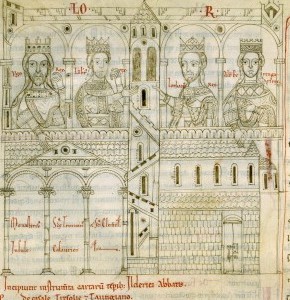Posts by Harry Cocks
King Hugh of Italy (c.885-948): Success and Failure
June 17, 2016
In his Antapodosis (‘Book of Revenge’, c. 960) the Italian bishop Liutprand of Cremona (d. c. 972) discussed the career of Hugh of Arles who had been the king of Italy between c.885 and 948 (pictured, left, in the twelfth-century chronicle of Johannes Berardi). It was his particular concern to cast a negative light on …
The ‘Unlawful’ Status of Homosexuality in Britain After Decriminalization
June 14, 2016
Even though male homosexuality was decriminalised in Britain in 1967, it still occupied a legal grey area in which it could be classified as ‘unlawful’ and contrary to the public good. As I explain in a new article for Social History (see link below) this was because of the revival of a common law offence …
Turkey: A State of Exception?
May 23, 2016
In 2013 peaceful protests against the development of Gezi park, one of the few remaining public green spaces in Istanbul, were brutally dispersed by police and security forces, generating worldwide headlines. The actions of the police were sanctioned by laws dating to the state of emergency established following the military coup of September 1980 and …
Drama and Politics in the House of Commons
April 20, 2016
On 2 May 1997, after suffering a heavy election defeat at the hands of Tony Blair, the outgoing British prime minister John Major told the assembled media on the doorstep of 10 Downing Street that ‘when the curtain falls, it is time to get off the stage’, Richard Gaunt writes. There could hardly have been …
Will Big Data “Disrupt” Historical Knowledge?
April 1, 2016
Arthur C. Clarke’s story The Nine Billion Names of God tells of a remote Tibetan monastery in which the monks have spent decades, perhaps centuries, listing the innumerable names of the deity with the aim of hastening the apocalypse. The narrator, a Western expert who has been asked to supply a powerful computer to help …
Popular Photography and the Third Reich
March 23, 2016
How should historians use “vernacular photography,” pictures and snaps taken for personal use, and not for publication? In a new article for the journal Central European History (see link), Professor Maiken Umbach addresses this question by exploring the significance of personal photography and photo-album making during Third Reich. These records offer valuable insights into everyday …
New Histories of Anglo-German Diplomacy under Elizabeth I and James VI and I
March 14, 2016
In his 1569 account of ‘The State of Germany’, the English diplomat Robert Beale recorded that, at mealtimes, the Count Palatine of the Rhine kept twenty-four tables of eight people each in two different rooms. ‘In the one place … sitteth himself, his wife, and Children standing att one Table, alone … And his gentlewomen …
The Execution of Benjamin Candler, Valet to the Duke of Newcastle, 1823.
January 15, 2016
On Friday 21 March 1823, three men – a half-pay army lieutenant named William Arden; John Doughty, a joiner, of Grantham, and Benjamin Candler, valet to the 4th Duke of Newcastle at Clumber Park – were hanged at Lincoln for sodomy or, as the handbill produced to commemorate the event said, ‘for committing Horrid Crimes’. …
The Russian Home Front In War And Revolution, 1914-22
January 10, 2016
My new book, Russia’s Home Front in War and Revolution, 1914-22, edited with Liudmila G. Novikova and Aaron B. Retish, presents a series of essays from leading international scholars that expand our understanding of the Russian Revolution through the detailed study of specific localities, Sarah Badcock writes. Answering the important question of how locality affected …
The Reformation and the Eastern Church
November 16, 2015
To the historian of religious change in Europe in its evangelical forms, such as the German, Swiss or English Reformations, the truth of the statement that the Orthodox churches have not experienced a Reformation seems incontrovertible, Liudmyla Sharipova writes. Indeed, in no area of Europe, where the population was exclusively or predominantly Eastern Orthodox in …




Recent Comments